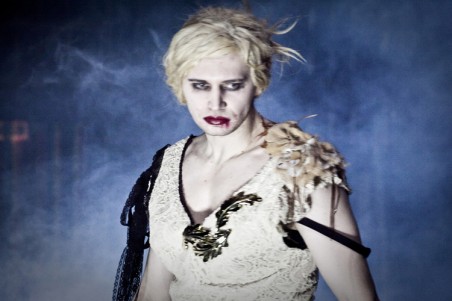
Rainbow Stand 2012, dir. Monika Strzępka
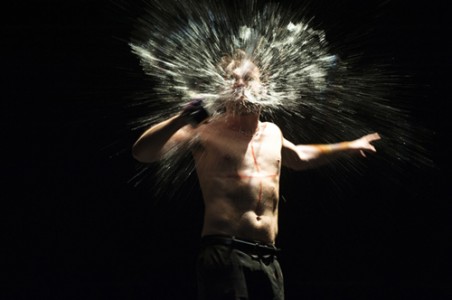
Forefather’s Eve, dir. Paweł Wodziński
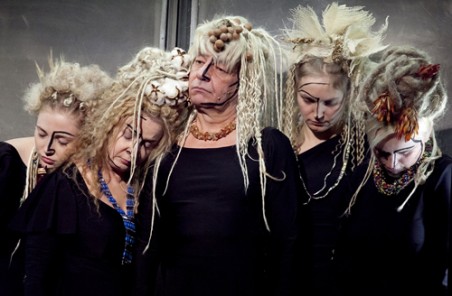
A Piece on Mother and Fatherland, dir. Jan Klata
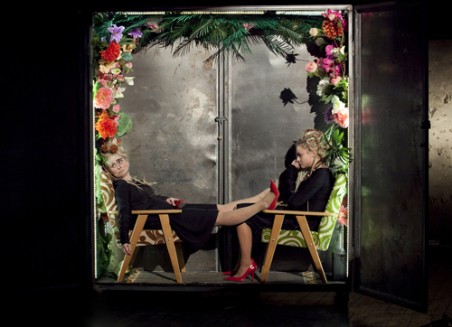
A Piece on Mother and Fatherland, dir. Jan Klata
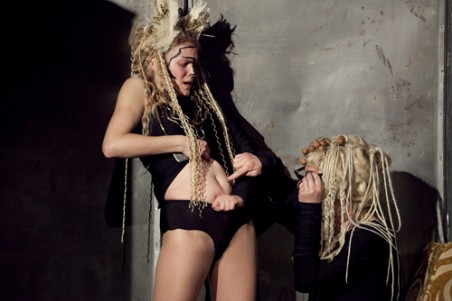
A Piece on Mother and Fatherland, dir. Jan Klata
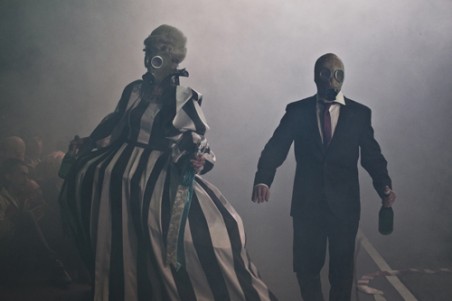
Rainbow Stand 2012, dir.Monika Strzępka
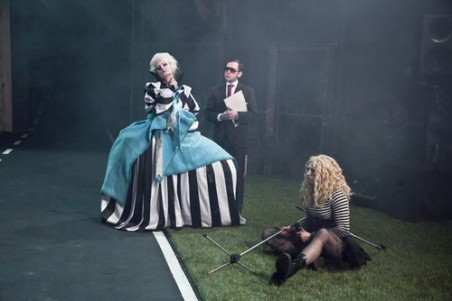
Rainbow Stand 2012, dir.Monika Strzępka
© Published in pARTisan #19’2012
Warsaw Theatre Meetings 2012, took place this spring, has once again confirmed not only the artistic activity of Polish Theatre. But the most important what the audience could see is Polish Theatre is ready to react to events occurring inside of the country and abroad.
(translated fragmentary)
The scale of theatre festivals in Poland can not be compared with the activities of this kind in Belarus. It’s not just the financial possibilities and the phenomenon of Polish theatre, which continues to keep a high standard of quality and relevance of the experiment. Polish festivals are differed by the concept based on pluralistic forms and themes.
Fifth Warsaw Theatre Meetings, took place this spring, has once again confirmed not only the artistic activity of Polish Theatre. But the most important what the audience could see is Polish Theatre is ready to react to events occurring inside of the country and abroad.
Ugly ‘face’ of Polish Romanticism
The most important subject in Polish modern theatre is the past — the dialogue with the tradition, with a ‘ghost’ of the past, destroying of stereotypes of Polish culture. Such performances often are production on the base of classical texts. Polish Theatre is known by its outrageous interpretations of classics (Checov’s The Seagull by Lupa or Apollonia by Varlikowski, for example).
Paweł Wodziński (Teatr Polski w Bydgoszcz) demonstrated his variant of the famous poem Forefather’s Eve by Adam Mickiewicz. Return to the classic text in this case is not an attempt to escape from reality (as opposed to Belarusian Theatre) as well as an interpretation of history from the perspective of today’s sense. The goal is to return the poem to its original voice, to destroy the stereotype about Romanism as something light and gentle. The director tried to give his answer on the question what face modern romanticism has.
There are not lights in the performance. The heroes don’t look like romantic heroes with high ideas. But it’s modernity and the face of it is ugly as well as the face of its hero who refutes and laughs at Romanism because it’s impossible today. But in this laugh so much grief that suddenly you can see nobody wants so strongly Romanism as the people destroyed its principles.
About Mother who leaves her Child
A number of recent performances continued A Piece on Mother and Fatherland by Jan Klata based on the novel by Bożena Keff (Teatr Polski w Wrocław). The performance became a space where the director tried to explore the theme of National Remembrance in Poland as well as the process of emancipation in modern society.
The choir of six women, sounding sometime together and suddenly divided into separate voices is an image of ‘collective Mother’ and ‘collective Daughter’ at the same time. Mother and Daughter, who tightly bound by their hair, would like to get rid of each other. But they can not do it because of the hair. They force forever to exist in a space of mutual recriminations. Thus, through the image of Motherhood Klata describe not only Polish national unconscious.
A Piece on Mother and Fatherland is called the group psychotherapy of the nation, which is covered by an obsessive state of grief, suffering and sacrifice. ‘Using African ritual Jan Klyata heals from the Polish arrogance through rhythm, music and mockery — wrote John Derkach in Gazeta Wyborcza. — The director shows in his performance Poland as a country of people who have black mourning dress which rooted to the skin, turning them into ‘the world’s Negroes’, the eternal slaves who crave escape from the inescapable ubiquitous enemies’.
Director questioned the patriotism in the present-day Poland. But have we the right to accuse of children, when the first who left them in the darkness was their Mother?
Rainbow Tribune: a few words about democracy
Momentary reaction of the Polish theater at present confirmed another favorite of the festival — the perfomance of Monika Strzępka Rainbow Stand 2012 based on the play by Paul Demirskaga. Early last year, when it became known that Eurofest 2012 will be held in Warsaw, the gay fan club Rainbow Tribune asked the Government to provide them special stand in the stadium. Fans didn’t get a positive answer and began a series of protest demonstration for their rights.
Playwright Paweł Demirski almost instantly reacted to these events, and in March 2011 on the stage of the Polish Theatre in Wroclaw, there was the premiere of his play.
As noted by many critics, the performance, of course, turned out not only on the issue of gay minorities in Poland. The story of the Rainbow Stand 2012 was merely a pretext for the playwright and director to cast doubt on effectiveness of the mechanism of democracy in Poland as well as in other countries; to expose the game of ‘double standards’ when the principles of democracy work only when it’s advantageous for State. But when we begin it talk about really equality – especially if the talking is about sexual minority – democratic principles of equality don’t work.
The performance leaves a strong impression — not only a powerful political message. But the proximity to the reality and problems that are being discussed is here and now.
Conditional character of the boundaries between art and reality, impossibility of artistic practices today to be isolated from society was accented by the protest of Polish theatrical community against reforms in Polish theater. After each performance of Warsaw Theatre Meetings one person read from the stage the treatment of the Polish theatrical community against the decision to appoint directors in place of the theater business managers. Obviously, it’s a step to commercialization of the theatre.
‘Theatre is not a firma or product, and a viewer is not a consumer, was written in the treatment. Instead of saying there are no actors, say it is better that no persons who make informed decisions …’
**************************************
Minsk. Even the spring sun doesn’t help to hide from grey colour of the buildings. To make a breath is easy, but to breathe out is still more often than to breathe in. In the bus a woman’s voice in the radio convinces me that it’s beautiful world. A lively young boy in LCD screen on the bus try to shocks me by information about crazy sale in Rubleuski supermarket.
Warsaw. Series of sterile glass skyscrapers make your eyes roll, attacking from all sides by millions of sunbeams. The walls of the old half-razburanavaga building of red brick in the former Warsaw ghetto, looking at me pictures of people that once lived here. Billboard on the hill next the bank says that life is good. Of the thousands of exchangers I choose this one, where in five minutes to deceive me for 25 euros. In Prague, Warsaw to aggressively tout guides for 2 hours walking I do not find any coffee shop — only perukarni, biedronki pivnuhi three — in the area of coffee in the coffee shops do not drink. I do not believe them. I do not believe anyone anymore. Him too.
The actors from Theatre of Wroclaw during 3 hours are telling me a story about the struggle of the Polish gays in their own sector of the stadium. A woman in a crinoline in black and white stripes during 3 hours gorgeous soprano aria about democracy betrayed. A group of gay men during 3 hours trying to get out of the ghetto, where they drove the democracy, because they are not normal! 3 hours of struggle, hope, and, of course, losing, because — against batons and gas reception there.
Theatre is not a product, and a viewer is not ae consumer! These words get into me, pass through the uterus and the drain on the inside of my thighs. I imagine standing before a small audience and read the text, may this text, because my uterus is compressed by spasm. I say that theatre is not a product, but we do not have customers. Applause.
I lift up shirt, pull on her face. On my bare chest was written trash, because the theater is not a product. I breathe, but the fabric is badly misses the air, and I’m starting to suffocate. I make a pause. I say that what is now done, nothing to do with femininity, because what you see now, not women’s breasts, I’m not showing you the chest, because I do not. Because the product of sex can not be. Applause.
I’m as wrote Agamben, a witness and a Muslim, one who is this God, and therefore can no longer testify himself. Applause. I am told that today people do not smoke in the oven, and I say that I smoke, I’m burning — Invisible on low heat. Applause.
I am the trash, which rises a light gust of wind in the free dance, spinning in the air and abstupleny building from all sides, broken windows of their sterile million sunbeams. Curtain
Translated by S.R. © photos by Natalia Kabanow, Magdalena Hueckel
Views expressed are those of the authors and may not reflect opinion of the editors. If you note any error, please contact us right away..




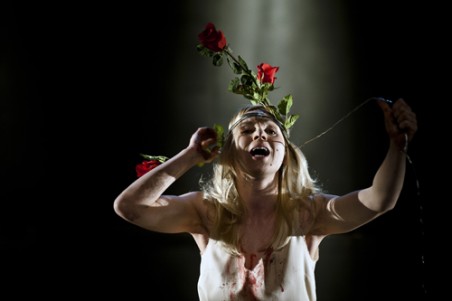
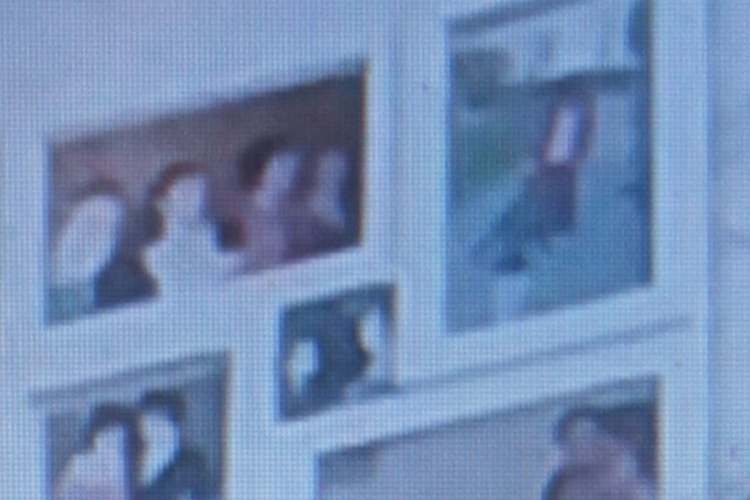
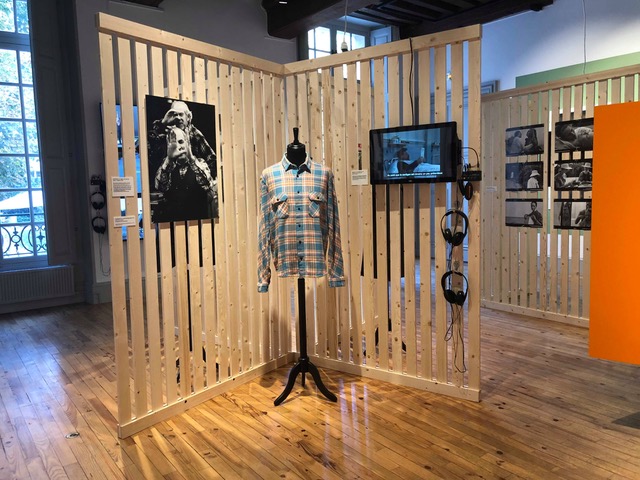
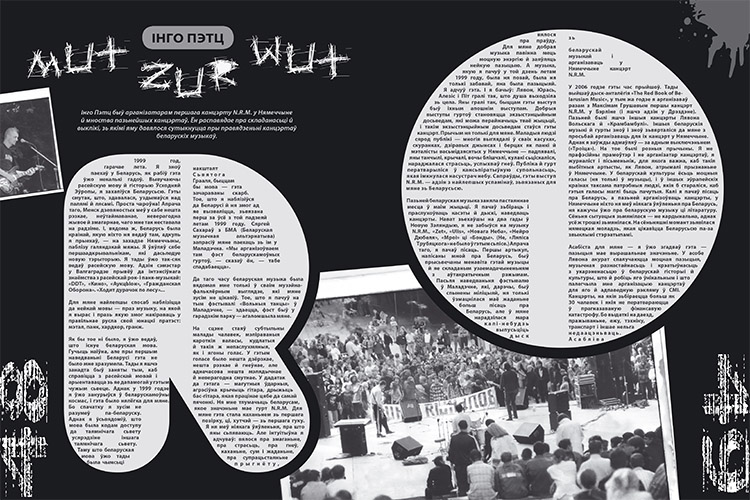
Thanks, we’ve tried )